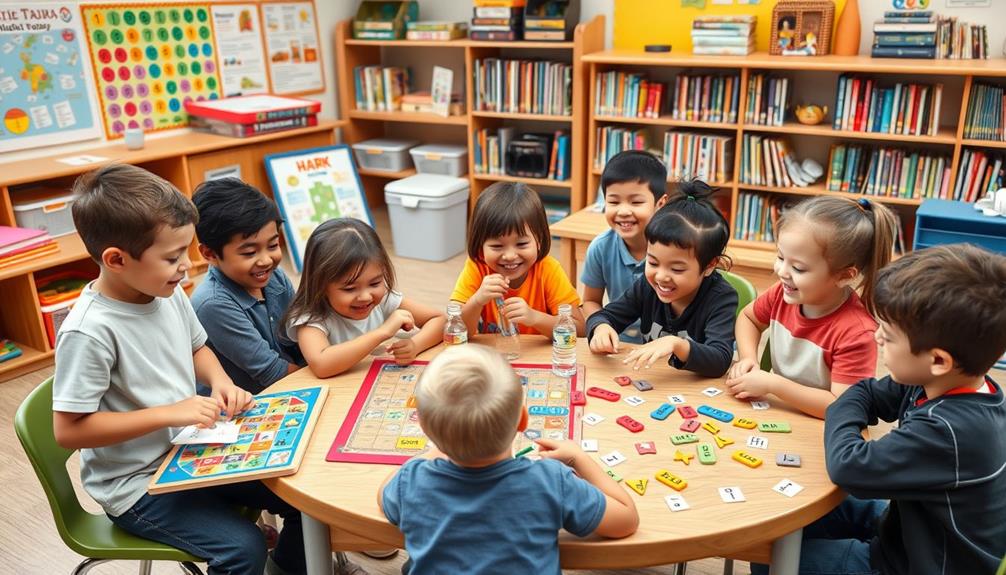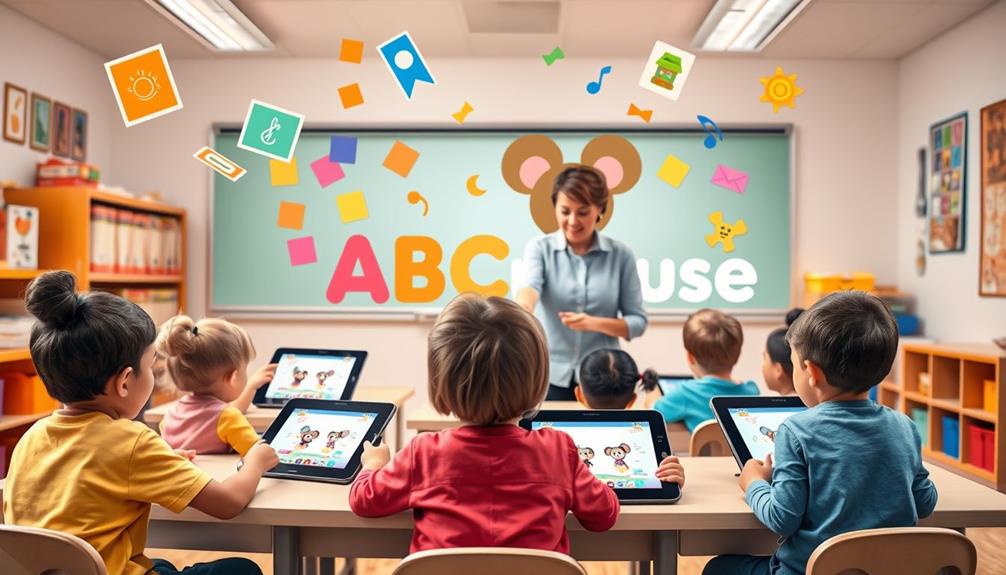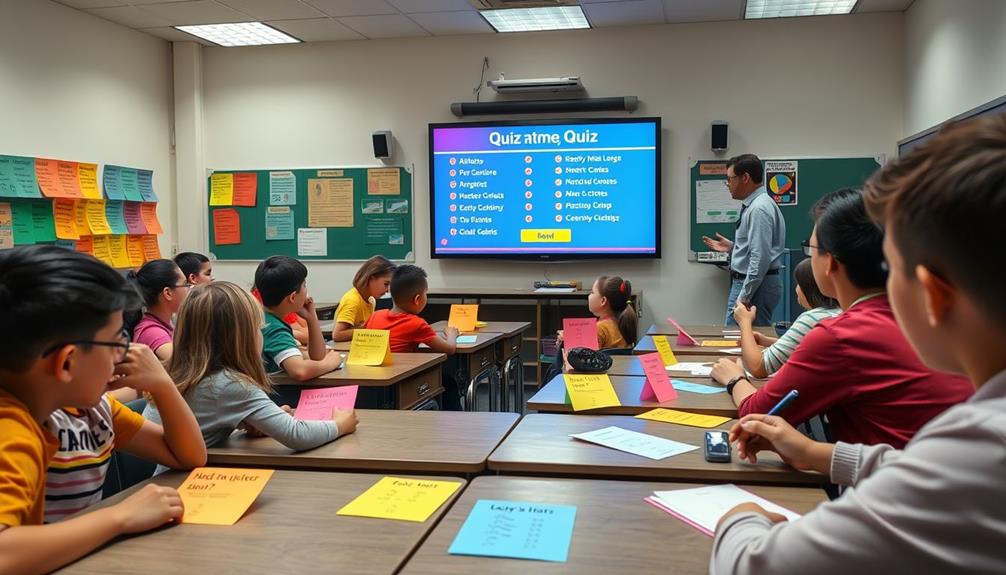Releasing your child's potential begins with fun and engaging educational games. These games enhance cognitive development, boost memory retention, and develop critical thinking skills. They cater to different learning styles, ensuring every child stays engaged while improving problem-solving abilities. Whether it's math puzzles or language games, your little one will benefit from interacting with various subjects in an entertaining way. These experiences cultivate curiosity and a lifelong love for learning, all while instilling valuable skills. If you're curious about which games to choose and their specific benefits, there's plenty more to explore!
Key Takeaways
- Educational games enhance cognitive development, improving memory retention and critical thinking skills essential for your child's academic success.
- They cater to diverse learning styles, ensuring maximum engagement and fostering a love for learning through fun and interactive experiences.
- Games promote problem-solving abilities, encouraging logical thinking and creativity, which are crucial for developing independent learners.
- Platforms like ABCmouse offer personalized learning paths, tracking progress to adapt to your child's unique strengths and improvement areas.
- Incorporating educational games creates a stress-free environment, reducing academic pressure while preparing children for future educational endeavors.
Importance of Educational Games
Educational games are essential tools for enhancing children's cognitive development. They not only make learning enjoyable but also greatly improve memory retention and critical thinking skills. When children engage in these interactive challenges, they naturally develop problem-solving skills as they navigate through various scenarios.
This play-based learning approach fosters an environment where kids can explore, experiment, and learn at their own pace.
Moreover, educational games support language development by introducing new vocabulary and concepts in a fun context. As children play, they're more likely to remember and apply what they've learned in real-life situations.
The diverse types of educational games cater to various learning styles, ensuring every child can benefit from this engaging method.
Categories of Educational Games

Games designed for learning come in various categories, each targeting different skills and interests. By engaging your child in these games for children, you can help them develop essential abilities while having fun. Here are three key categories:
- Math and Logic Games: These games enhance critical thinking and problem-solving skills through arithmetic challenges and logical puzzles. They promote numerical understanding and make math enjoyable. Incorporating hands-on experiences can further solidify these concepts, making learning more effective.
- Language and Literacy Games: These focus on improving language skills and reading comprehension. Interactive word challenges foster a love for language, enhancing your child's communication abilities. Engaging in these activities also supports language development through communication and interaction with peers.
- Creativity and Arts Games: These nurture your child's artistic expression and creative play. Engaging in drawing, building, and design-based activities allows them to explore their imagination and creativity.
Additionally, don't overlook the importance of Social and Emotional Games, which teach empathy and cooperation, helping kids develop emotional regulation through role-playing scenarios.
With these diverse categories, you can release your child's potential and guarantee they gain valuable skills that will benefit them throughout their lives.
Benefits of Educational Games

Playing fun and engaging activities can greatly boost your child's cognitive development. Educational games are designed to make learning enjoyable while simultaneously enhancing problem-solving abilities. They challenge your child to think critically and creatively, fostering skills development in a supportive environment. Here's a quick summary of the benefits:
| Benefit | Description |
|---|---|
| Cognitive Development | Improves memory retention through interactive challenges. |
| Skills Development | Enhances literacy and numeracy skills for academic success. |
| Problem-Solving Abilities | Encourages logical thinking and creativity in various scenarios. |
| Instant Feedback | Allows children to learn from mistakes, reinforcing lessons. |
| Curious Learning Environment | Cultivates a love for learning and fosters curiosity. |
Integrating Games in Learning

When you incorporate interactive activities into your teaching methods, you can transform the learning experience for children. Games encourage exploration and curiosity, making learning an enjoyable journey. By integrating educational games, you not only motivate your kids but also enhance their cognitive development. Additionally, incorporating elements from crazy games can further enrich the learning atmosphere.
Here are three powerful benefits:
- Personalized Learning: Tailoring games to fit specific educational needs allows children to learn at their own pace.
- Engagement: Incorporating games in daily routines keeps kids excited and enthusiastic to learn, turning lessons into fun adventures.
- Social Skills Development: Collaborative educational games foster teamwork and communication, helping children learn essential social skills through shared experiences.
When children learn through play, they're more likely to retain information and apply it in real-life situations.
Plus, engaging in activities allows them to tackle problem-solving and critical thinking challenges in a stress-free environment. By making learning interactive, you're setting the stage for holistic development, where academic knowledge intersects with essential life skills.
Exploring WizzleEd's Offerings

WizzleEd offers an impressive variety of high-quality educational games that can truly captivate young minds while promoting effective learning. From math puzzles to language challenges and creative activities, you'll find options that cater to various learning styles and developmental needs. Each game is designed to enhance cognitive development, fostering critical thinking and problem-solving skills.
Incorporating elements from healthy lifestyle blogs can also provide insights on balancing educational play with physical activity and nutrition, ensuring a well-rounded approach to your child's development.
What sets WizzleEd apart is its focus on hands-on learning. The interactive nature of these educational games reinforces classroom lessons and encourages your child to explore independently. As they engage with the content, they'll not only grasp essential concepts but also discover the joy of learning through play.
WizzleEd integrates fun and engaging elements, making education an exciting adventure. This approach motivates children to develop a lifelong love for learning, ensuring they remain curious and creative.
Overview of ABCmouse

ABCmouse serves as a dynamic educational platform tailored for children ages 2-8, offering an extensive collection of over 10,000 interactive activities across various subjects, including reading, math, science, art, and music.
This engaging platform makes learning enjoyable for your children, helping them develop essential skills through fun games and activities. Additionally, studies suggest that incorporating certain signs are viewed as more appealing socially into your educational approach can enhance children's confidence and attractiveness in social settings.
With ABCmouse, you can expect:
- Comprehensive Learning: Your children can explore a wide range of subjects, ensuring a well-rounded education.
- Accessibility: The platform is available on both web and mobile devices, allowing learning anytime, anywhere.
- Progress Tracking: You can monitor your child's development and celebrate their achievements along the way.
ABCmouse promotes independent learning, catering to diverse learning styles and paces, making it a favorite among over 1 million active subscribers.
With a subscription fee of around $12.99 monthly or $59.99 annually, plus a 30-day free trial, you can explore this rich learning environment without commitment.
By integrating educational games into your child's daily routine, you're nurturing their development and revealing their full potential. These games can help improve cognitive skills such as problem-solving, critical thinking, and decision-making. Many educational games also promote social skills like teamwork, communication, and cooperation. For example, playing games like monopoly go free dice can teach children the importance of strategic thinking and planning ahead. It’s an enjoyable way for kids to learn valuable life skills while having fun.
Embrace this opportunity to enhance your child's learning experience today!
Learning Features of ABCmouse

With an impressive array of over 10,000 interactive educational activities, ABCmouse provides a rich learning environment for young children. The platform focuses on engaging children aged 2-8 across various subjects, including reading, math, science, art, and music. These educational activities are designed to captivate young minds, making learning not just effective but also enjoyable.
Moreover, parents can explore top platforms for freelance gigs that complement educational growth by encouraging skill development.
One of the standout learning features of ABCmouse is its alignment with early childhood education standards, ensuring that your child receives age-appropriate content. As they progress, you can utilize the built-in progress tracking tools, which allow you to monitor their skill development and adjust learning paths as needed. This helps create a tailored educational experience that meets your child's unique needs.
In addition, ABCmouse offers printable worksheets for offline learning, complementing the digital activities and providing a well-rounded educational approach. The inclusion of multimedia elements, like songs and puzzles, enhances the overall experience, making it memorable and fun.
With these thorough learning features, ABCmouse stands out as an invaluable resource for fostering your child's love of learning.
Educational Impact of ABCmouse

When you explore ABCmouse, you'll find that its engaging interactive learning keeps kids motivated and enthusiastic to learn.
By incorporating elements that promote imaginative play and problem-solving, ABCmouse aligns with the benefits of interactive preschool role-play toys, making education fun and effective.
The platform not only tracks skill development but also adapts to different learning styles, ensuring that your child gains essential skills while enjoying the process.
Engaging Interactive Learning
Engaging children in interactive learning is essential for their early development, and ABCmouse excels in this area. With over 10,000 educational activities, it offers a treasure trove of play activities designed to enhance memory and foster a love for learning.
By immersing your child in dynamic interactive games, you're not just making learning fun; you're also encouraging children to think critically and independently. Additionally, incorporating holistic lifestyle approaches can further support your child's overall well-being, enhancing their ability to engage with educational content.
Here are three powerful benefits of ABCmouse's interactive approach:
- Boosts Readiness: The platform's engaging content prepares your child for kindergarten, making the shift smoother and less stressful.
- Supports Mental Health: Fun learning experiences can reduce anxiety associated with academic pressure, promoting a positive mindset toward education.
- Caters to Diverse Learning Styles: With multimedia resources, including songs and puzzles, ABCmouse guarantees every child finds a way to connect with the material.
Skill Development Tracking
ABCmouse offers a robust skill development tracking system that empowers parents and educators to keep a close eye on a child's progress. This all-encompassing progress tracking allows you to monitor skill development across essential subjects like reading, math, science, art, and music. With over 10,000 educational activities available, ABCmouse guarantees that your child's learning experience is engaging and tailored to their unique pace.
Through skill development tracking, you can see how specific activities enhance your child's understanding and readiness for kindergarten. Parents can create personalized learning paths based on their child's strengths and areas needing improvement.
Here's a quick overview of how ABCmouse tracks progress:
| Subject | Skill Development Indicators |
|---|---|
| Reading | Literacy skills, vocabulary growth |
| Math | Number recognition, problem-solving |
| Science | Inquiry skills, concept understanding |
With printable worksheets complementing online learning, you can reinforce skills tracked through the digital interface. By engaging in play, you help children develop essential skills while keeping them excited about learning. This holistic approach lays a solid foundation for their future educational endeavors.
Subscription and Pricing Options

Finding the right educational tool for your child can feel overwhelming, but ABCmouse makes it easier with its flexible subscription and pricing options. You can select a plan that fits your family's needs and budget, ensuring your child has access to valuable educational resources.
Here are some key benefits of ABCmouse's subscription options:
- Affordable Monthly Fee: For just $12.99 per month, you can give your child access to a wealth of interactive activities.
- Cost-Effective Annual Plan: Save money with the annual subscription priced at $59.99, perfect for families committed to long-term learning.
- Family Plan Discounts: If you have multiple children, the family plan offers discounts, making it easier to provide educational resources for everyone.
Additionally, ABCmouse provides a generous free trial period of 30 days, allowing you to explore the platform before making a commitment.
You'll appreciate the straightforward cancellation policy, with no hidden fees, giving you peace of mind as you invest in your child's education.
With these options, you'll find that enhancing your child's learning experience is both simple and affordable.
Whole-Brain Development Approach

When you choose educational games, consider how they can engage both your child's right-brain skills, like creativity and intuition, and left-brain skills, such as language and logic.
Incorporating family activities that promote creativity can enhance this learning experience even further.
This balanced learning experience fosters deeper understanding and critical thinking.
Right Brain Skills
Engaging in activities that stimulate right brain skills, like imaginative play and artistic expression, is essential for children's holistic cognitive development. These skills—creativity, intuition, and problem-solving—help children navigate the world more effectively.
By fostering these abilities, you're equipping your child with tools for emotional regulation and empathy. Incorporating elements of herbalism practices can also enhance their understanding of nature and holistic health.
Here's why right brain skills matter:
- Enhanced Creativity: Imaginative play encourages your child to think outside the box, sparking innovative ideas.
- Improved Emotional Regulation: Nurturing these skills helps children manage their emotions, leading to healthier relationships.
- Increased Engagement: Play-based learning strategies, especially those involving artistic games, motivate children to dive deeper into their learning experiences.
Incorporating activities that promote these right brain skills can transform the way your child interacts with challenges.
Whether it's through storytelling, drawing, or role-playing, each moment of play serves as a stepping stone to greater creativity and problem-solving abilities.
As you support your child's development, remember that a balanced approach, nurturing both right and left brain skills, will create a well-rounded individual ready to face the world.
Left Brain Skills
To foster a well-rounded cognitive development in children, it's just as important to nurture left brain skills alongside right brain abilities. Left brain skills focus on logical reasoning, language processing, and analytical thinking, all essential for academic success and effective communication. Engaging your child in educational games that promote these skills can greatly enhance their problem-solving capabilities and critical thinking.
Here's a quick overview of some left brain activities:
| Activity Type | Benefits |
|---|---|
| Math Puzzles | Improves logical reasoning |
| Language Games | Enhances language processing |
| Analytical Challenges | Boosts critical thinking skills |
| Structured Play | Supports numeracy & literacy |
Incorporating left brain-focused games into your child's daily routine isn't just fun; it reinforces classroom lessons and caters to diverse learning styles. Plus, educational games provide instant feedback, enabling your child to learn from mistakes and improve their cognitive abilities in real-time. By nurturing left brain skills, you're laying a strong foundation for your child's overall intellectual growth.
Balanced Learning Experiences
A balanced learning experience is essential for fostering whole-brain development in children. By nurturing both creative and analytical skills, you can greatly enhance your child's development. Engaging in play isn't just fun; it's a fundamental part of learning that builds the foundation for lifelong skills.
Incorporating activities that promote physical well-being, such as safe second trimester workouts for pregnancy, can also set a positive example for children. Consider incorporating these three types of play into your child's routine:
- Imaginative Play: Activities like role-playing or storytelling spark creativity and emotional intelligence.
- Physical Play: Movement-based games promote coordination and social skills, essential for teamwork.
- Structured Play: Puzzles and educational games develop problem-solving abilities and critical thinking.
These diverse experiences create a rich environment that supports whole-brain development. Research shows that children develop 80% of their brain functions by age three and 90% by age five, making these early years essential for learning.
Frequently Asked Questions
How to Unlock Your Child's Potential?
To open your child's potential, encourage exploration and creativity. Incorporate diverse learning activities into their routine, providing instant feedback. Foster their interests, support problem-solving, and nurture social skills to help them thrive academically and personally.
Do Educational Games Help Kids Learn?
Yes, educational games definitely help kids learn. They promote problem-solving and critical thinking while providing instant feedback. Engaging in these interactive challenges enhances memory retention, language skills, and readiness for future academic success.
What Should Games and Apps Encourage Your Child to Be?
Games and apps should encourage your child to be curious, creative, and collaborative. They'll help develop critical thinking, empathy, and communication skills, making learning fun while fostering a love for knowledge and exploration.
How to Make Educational Games for Kids?
To make marvelous educational games for kids, align activities with academic aims, incorporate interactive elements, utilize varied media, provide prompt feedback, and promote playful partnerships. These strategies spark learning and strengthen social skills simultaneously.
Conclusion
As you explore the world of educational games, you might just reveal a hidden treasure of potential within your child. Imagine the excitement as they engage, learn, and grow, all while having fun. But what if you could access even more possibilities? By integrating these tools into their learning routine, you're not just playing games; you're shaping their future. So, are you ready to take the leap and discover how far your child can truly go?










